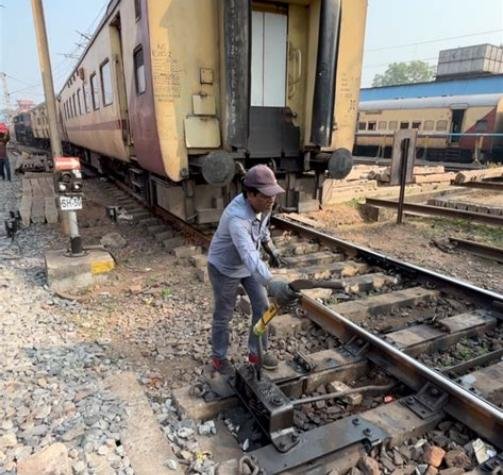We are happy to publish below an interview with Shri Purshottam Gothwal, General Secretary, All India Pointsmen Association (AIPMA), conducted by Dr. A. Mathew, Convenor, All India Forum Against Privatisation (AIFAP).
Shri Gothwal has highlighted grave injustice being meted out to pointsmen by continuing to categorize their duty as Essentially Intermittent (E.I.) although today, the number of trains running over 24 hours has increased by more than 10 times compared with 1961, when their duty was first categorized as E.I.
Shri Gothwal also reiterated their firm opposition to the privatisation of public sector enterprises.

Dr. A. Mathew: I thank you for your participation in the “All-India Conference on Privatisation in Electricity and Other Sectors,” held at New Delhi on 15 April 2025, organised by All India Forum Against Privatisation (AIFAP).
What are the specific problems faced by the pointsmen of Indian Railways and what are the demands raised by AIPMA to solve these problems?
Shri Purshottam Gothwal: All India Pointsmen Association (AIPMA) is very much thankful to AIFAP for inviting me and our Association to the important conference against privatisation that AIFAP had organized in New Delhi.
I would like to say that our Association (AIPMA) was purely established to resolve our category problems by bringing them to the notice of the Administration as well as both Federations of Indian Railways.
The pointsmen of Indian Railways are mainly suffering from 3 major problems.
At the AIFAP conference, I had handed over a letter addressed to you, which explained in detail these three problems, and I request the support of AIFAP and Kamgar Ekta Committee in our struggle for justice.
- We demand the abolition of 12-hr roster/Essentially Intermittent (E.I.) category for pointsmen
When Essentially Intermittent (E.I) Roster was implemented in 1961 for pointsmen, there were only 10–15 trains running over 24 hours. Nowadays, 110–130 trains are running on the main line and 50–75 trains are running in branch lines over 24 hours.
With the E.I. Roster, we are facing many problems due to 12-hr duty (72 hrs per week). It was possible when there was less work, but now it is difficult to deal with increased traffic, which can be up to 100 trains in a shift. So, our work can no longer be classified as E.I., but it is of a continuous nature. With 12-hr roster, we are unable to get sufficient rest and time to spend with our family, and this is a big injustice with us. Hence, we demand continuous roster (8-hr duty) for the Pointsman Category.
- Risk and hardship allowance
Our work involves risk and difficult conditions. Pointsmen are directly involved in all safety operations of trains movements like shunting of passenger as well as freight trains. While doing their duty, many pointsmen have lost their lives.
In the past 1 year alone, we have lost 18 pointsmen in different divisions. The pointsmen are involved in direct train movements, which involves a lot of risk in their 12 hrs of duties. We are assigned numerous duties such as attaching and detaching (shunting) of passenger coaches and goods wagons, as well as stabling and securing of rakes in the wayside stations, clamping, paddocking and piloting of trains, and exchanging all right signals.
Although AIPMA has represented this matter of risk and hardship allowance, which we are entitled to get, the matter is pending since 2018. In 2019, the Railway Board had constituted a committee for inclusion of fresh categories within the ambit of risk and hardship allowance. The Committee undertook extensive study of the risk and hardship faced by various cadres in Indian Railways. The Committee recommended the inclusion of 8 categories of various departments within the ambit of risk and hardship allowance and enhancement of rate of the said allowance for keymen and patrolmen. The said recommendations are expected to benefit about 3.62 lakh employees at an additional annual financial implication of approx. Rs. 856.85 crore. The report of the Committee has been submitted for the consideration of the Railway Board, but a decision has not yet been taken.
- Lack of promotional opportunities to the pointsmen category of operating department (4-grade pay structure)
If an employee joins service in the Indian Railway as an Assistant Pointsman, even after 30 years of service, he will not get any cadre or financial benefits. A committee had been constituted in 2019 to examine the 4-grade pay structure for pointsmen.
However, the recommendations of the committee are yet to be released. Assistant pointsmen can only expect one promotion to pay level 2 in their entire services. This is grossly unjust and we demand 4-grade pay structure.
Dr. Mathew: Ever since the policy of Liberalisation, Privatisation and Globalisation (LPG) was launched in 1991, successive governments at the centre have taken steps to privatise public sector industries, whether it is Railways, Electricity, Banks, Insurance, Defense, Port and Docks, Air India, BSNL, Steel, Oil and Gas, etc. It is to oppose these steps that AIFAP was formed in 2021. Our Conference in New Delhi on 15 April 2025 was an important step in bringing various Federations/Associations of these sectors together on one platform.
What do you feel needs to be done to oppose these policies?
Shri Gothwal: AIPMA is totally opposed to the privatisation of public sector enterprises, including railways, electricity, banking, insurance, etc. That is the reason we participated in the AIFAP conference on 15 April. I personally came from Jaipur for the meeting.
Dr. Mathew: Thank you Mr. Purshottam Gothwal for sharing your views.
